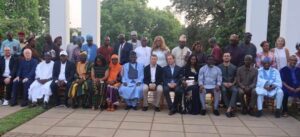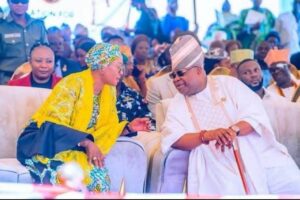
The Governor of the Central Bank of Nigeria (CBN), Olayemi Cardoso, says the bank has satisfied the convening of its Monetary Policy Committee (MPC) meeting for the year after failing to hold it in almost four months, amid naira depreciation against the dollar and soaring inflation.
The apex bank governor disclosed this on Friday while delivering his keynote address at the 58th Annual Dinner of the Chartered Institute of Bankers of Nigeria in Lagos.
“For the avoidance of doubt, the Central Bank of Nigeria Act 2007 requires that the meeting of the Monetary Policy Committee of the bank be held at least four times a year, and the Bank has satisfied this requirement for 2023,” he said.
He explained that his focus since assuming office two months ago has been on ensuring these meetings are useful and effective.
“I am happy to report that our efforts over the past two months have begun to yield fruit,” he said.
For quite some time, the CBN boss said there has been a dislocation of its monetary transmission mechanisms rendering the MPC meetings largely ineffective.
On Monday, the Central Bank of Nigeria (CBN) postponed the crucial Monetary Policy Committee (MPC) meeting scheduled for this month. The move, according to financial analysts, has further intensified concerns and uncertainties among investors.
The recent postponement implied that the apex bank failed to convene for the monetary policy committee meeting in almost four months in the face of significant depreciation of the naira against the dollar and its attendant inflationary pressure.
The newly appointed CBN governor, Mr Cardoso, has yet to hold the MPC meeting since he took over from his predecessor in September.
According to the MPC schedule published on the apex bank’s website, the last time the bank held its MPC meeting was on 25 July, almost four months ago.
The MPC had its three other meetings earlier in the year. The first for the year was held on 23 January, while the second and third meetings were held on 20 March and 22 May respectively.
What we’ve been doing
On Friday, Mr Cardoso said since assuming office, he has been working with his team at the bank to address challenges.
“We have critically reviewed the effectiveness of the central bank’s monetary policy tools and have spent time fixing the transmission mechanism to ensure the decisions of MPC meetings actually result in desired objectives,” he said.
The CBN governor said he is confident that with continued tightening measures for the next two quarters, the apex bank will be able to effectively manage inflation.
“While absolute inflation is still rising, the declining rate of growth indicates progress. I am happy to report that our efforts over the past two months have begun to yield fruit,” he said.
Ongoing efforts
The apex bank boss said the CBN is committed to achieving monetary and price stability. This, he said, is not just a technical objective, but it has real-life implications for the well-being of citizens.
Through targeted policies, transparent market operations, and coordination between monetary and fiscal authorities, Mr Cardoso said the CBN can ensure a more stable exchange rate, control inflation, and create an enabling environment for businesses and individuals to thrive.
He listed some of the CBN’s efforts to address monetary challenges to include using the regular Open Market Operations (OMO) to mop up excess liquidity from the banking system.
Recently, an OMO auction was held with a stop rate of 17.5 percent for the one-year tenor, attracting oversubscription of N350 billion.
Mr Cardoso said another round of OMO has been approved to further reduce excess liquidity.
He noted that another effort of the CBN bearing fruit was the offering of N108.1 billion worth of Treasury Bills with three tenors to the investing public. This, he said, can help reduce liquidity in the banking system and support government fundraising.
He also mentioned the removal of the cap on the remunerable Standing Deposit Facility (SDF) to increase activity in the SDF window and manage liquidity.
The CBN governor explained that the bank had strayed from its core mandates and was engaged in quasi-fiscal activities that pumped over 10 trillion naira in the economy through different initiatives in sectors ranging from agriculture, aviation, power, youth and many others.
He said: “These clearly distracted the bank from achieving its own objectives and took it into areas where it clearly had limited expertise.
“We will tackle institutional deficiencies, restore corporate governance, strengthen regulations, and implement prudent policies. We assure investors and the business community that the economy will experience significant stability in the short-to-medium term as we recalibrate our policy toolkits and implement far-reaching measures.”






